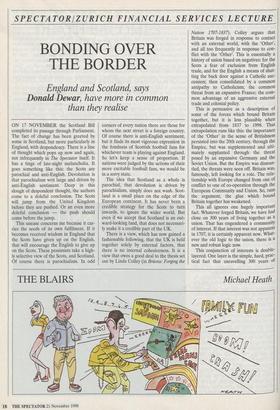SPECTATOR/ZURICH FINANCIAL SERVICES LECTURE
BONDING OVER THE BORDER
than they realise
ON 17 NOVEMBER the Scotland Bill completed its passage through Parliament. The fact of change has been greeted by some in Scotland, but more particularly in England, with despondency. There is a line of thought which pops up now and again, not infrequently in The Spectator itself. It has a tinge of late-night melancholia. It goes something like this: the Scots are parochial and anti-English. Devolution is that parochialism writ large and driven by anti-English sentiment. Deep in this slough of despondent thought, the authors come to a doleful conclusion. The Scots will jump from the United Kingdom before they are pushed. Or an even more doleful conclusion — the push should come before the jump.
This unease concerns me because it car- ries the seeds of its own fulfilment. If it becomes received wisdom in England that the Scots have given up on the English, that will encourage the English to give up on the Scots. These pessimists take a high- ly selective view of the Scots, and Scotland. Of course there is parochialism. In odd corners of every nation there are those for whom the next street is a foreign country. Of course there is anti-English sentiment, but it finds its most vigorous expression in the fondness of Scottish football fans for whichever team is playing against England. So let's keep a sense of proportion. If nations were judged by the actions of their more excitable football fans, we would be in a sorry state.
The idea that Scotland as a whole is parochial, that devolution is driven by parochialism, simply does not wash. Scot- land is a small place on the edge of the European continent. It has never been a credible strategy for the Scots to turn inwards, to ignore the wider world. But even if we accept that Scotland is an out- ward-looking land, that does not necessari- ly make it a credible part of the UK.
There is a view, which has now gained a fashionable following, that the UK is held together solely by external factors, that there is no internal cohesiveness. It is a view that owes a good deal to the thesis set out by Linda Colley (in Britons: Forging the Nation 1707-1837). Colley argues that Britain was forged in response to contact with an external world, with the 'Other', and all too frequently in response to con- flict with the 'Other'. This is essentially a history of union based on negatives: for the Scots a fear of exclusion from English trade, and for the English a means of shut- ting the back door against a Catholic suc- cession; then consolidated by a common antipathy to Catholicism; the common threat from an expansive France; the com- mon advantage of an aggressive external trade and colonial policy.
This is persuasive as a description of some of the forces which bound Britain together, but it is less plausible when extrapolated from 1837 to 1998. That extrapolation runs like this: the importance of the 'Other' in the sense of Britishness persisted into the 20th century, through the Empire, but was supplemented and ulti- mately supplanted through the threat posed by an expansive Germany and the Soviet Union. But the Empire was disman- tled, the threats were seen off. Britain was, famously, left looking for a role. The rela- tionship with Europe changed from one of conflict to one of co-operation through the European Community and Union. So, runs the argument, the glue which bound Britain together has weakened.
This all ignores one hugely important fact. Whatever forged Britain, we have had close on 300 years of living together as a union. That has engendered a community of interest. If that interest was not apparent in 1707, it is certainly apparent now. What- ever the old logic to the union, there is a new and robust logic now.
This conjunction of interests is double- layered. One layer is the simple, hard, prac- tical fact that unravelling 300 years of union would be a complex, costly, awkward business. It would not just be a matter of turmoil in the economy. Every aspect of national life — everything that has func- tioned perfectly well at a UK level would have to be unravelled and reinvent- ed in Scotland, everything from Customs and Excise to the Intervention Board for Agricultural Produce, from the Benefits Agency to the Foreign Office, from National Insurance to the National Debt. And all these extra overheads would have to be carried on a far smaller financial base in Scotland.
But I do not need to defend the union on the basis of the practical costs of sepa- ration alone. For separation runs against the grain of our community of interests. As the factors identified by Colley fell away, other, positive interests took their place. We have shared interests in the world. Look at security. What conceivable exter- nal threat is there which Scotland and England would not face together? Look at international security. Where, in any of the hot spots of the world from Iraq to the Congo, is there an interest which is English or Scottish, but not British? Look at world trade. Where in the complex jun- gle of world trade negotiations do the interests of Scottish business part from those of English business? The export focus may vary between sectors, but the !tindamentals are the same — the common interest in an open world-trading system. Think about the bodies through which British interests are projected into the international arena. Is there really a crying need for a separate Scottish seat in the UN, a separate place at the Nato table, a separate delegation to the WTO? This is about more than another place at the table. This is about fracturing the ability of these small islands to exert their influence on the world with cohesion, with coher- ence and with power. It is sometimes claimed that the Scots are more pro-European than the English. Perhaps the Scots are more comfortable with the idea of closer European ties, hav- ing preserved their identity successfully through union with a bigger neighbour. It May have reflected a Scottish antipathy to a virulent Euroscepticism which claimed to he representative of the UK, but was not and is not. Either way, English and Scots share together an interest in seeing an EU Which works to preserve peace and build Prosperity. And they share a need for the strongest possible articulation of that inter- est, through a single and united UK voice. What about business and industry? It is to state the transparently obvious to say that the English and Scottish economies are inextricably linked. Indeed, in some respects they are one economy. Compa- nies have built their operations — and cre- ated jobs — on that basic assumption. ,Ports from Scotland to the rest of the UK were worth more in 1995 than exports 10 the rest of the world put together. The biggest export market for Scottish food and drink, chemicals, financial services, engineering products is emphatically the rest of the UK. Well over 350,000 jobs in Scotland are related, directly and indirect- ly, to that trade. Over half the 50 top pri- vate sector employers in Scotland are headquartered in England.
The shared interests of Scots and English go beyond our place in the world and our economic ties. Underpinning both are our shared values. We have grown to democra- cy together. We have built the welfare state together. We have nurtured and protected the rule of law together. These things might find different institutional expres- sion, for example through the separate Scottish legal system or the different man- agement arrangements for the NHS in Scotland. But the core values are common and reflect an indivisible commitment to tolerance, to a sense of justice, to fairness.
In short, we occupy a shared space. Shared space on these islands, but shared space, too, in the way we live, in the way we work, in the way we structure our soci- ety. Devolution does not challenge that conjunction of interests. Far from it. Devo- lution builds on the foundations laid by that conjunction of interests. It is not about unravelling ties. It is about better governance within the space we share.
The Scottish parliament is the solution to a constitutional anomaly which has been debated long and hard over 30 years and more. It addresses the place of Scotland in the UK, finds the balance for Scotland in the UK. It has naturally stimulated debate in England about England's place in the UK, and why not? But it is dangerous to jump straight from Scottish solutions to English conclusions.
The stoking of English nationalism, the push for an English parliament have the smack of an idea caught on the rebound. Just because there is a parliament in Scot- land does not make it inevitable that there should be a parliament in England. Just because the Scots have got a degree of self-government they have long been ask- ing for does not mean that the cross of St George need be opposed to the Saltire.
I believe that we have a devolution set- tlement to be proud of. It is the product of hard thought and hard work. But all the Scotland Act can do is encapsulate, not create, the community of interest which makes the UK a viable proposition. It will work, not because of clever drafting, but because there will be the goodwill to make it work. The goodwill is there because we have a shared outlook on the world. And the roots of that run deep.
Extracted from the annual Spectator/ Zurich Financial Services lecture, delivered by the Secretary of State for Scotland in London on 18 November.



















































































 Previous page
Previous page